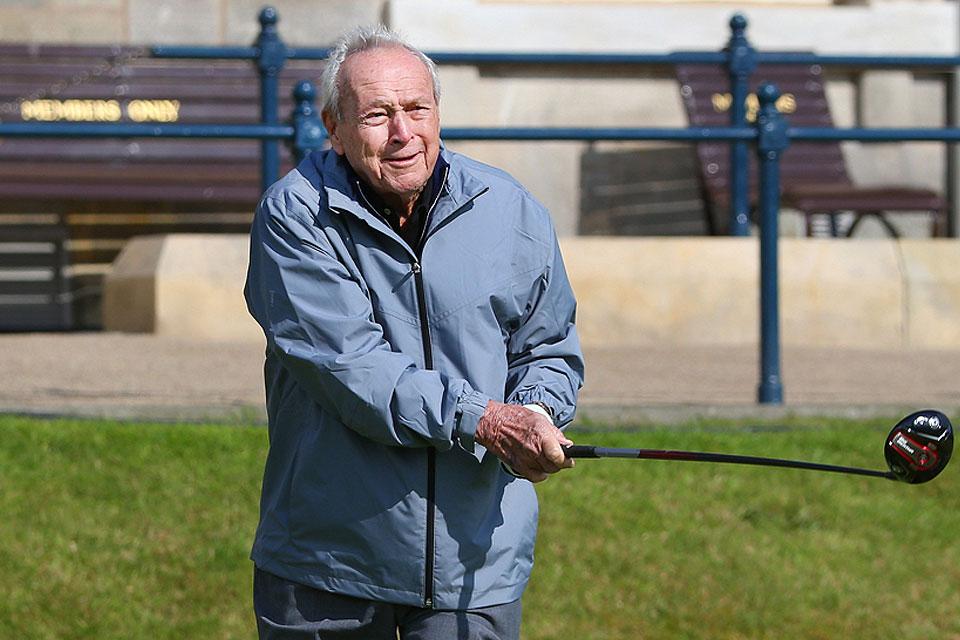Arnold Palmer, America’s first commercial hero
CHASKA, Minnesota - The earthy, endearing and gifted Arnold Palmer left a brilliant legacy in golf but he transcended the links, launching an era of sports stars as high paid pitchmen and pioneering in sports media.
"Something of a pop hero," Bob Dorfman, creative director at San Francisco's Baker Street Advertising, told Reuters about Palmer, who died on Sunday aged 87.
"A trend-setter in terms of sports endorsements on TV. It was kind of the right guy, the right personality, the right time."

Palmer, winner of seven majors, captured the public's imagination with his everyman demeanor, swashbuckling style and good looks just as television was coming of age nearly 60 years ago.
"Our first commercial sports hero," former CBS Sports president Neal Pilson said in a telephone interview. "He created the television audience that still exists today."
Beyond his go-for-broke style and accomplishments on the course, Palmer was also remembered on Monday as a philanthropist in his adopted hometown of Orlando.
Mike McCarley, president of the Orlando-based Golf Channel that was co-founded by Palmer, spoke to yet another side of 'The King'.
"There's a medical center that bears his name in Orlando because he decided that we, as a community, could do better for the kids of the community," McCarley told Reuters.
"Children are born in Winnie Palmer Hospital (named after his late wife). When they get sick, they go to the Arnold Palmer Hospital for Children. Across the entire community, it's an incredible impact."
Big brands
At a time when leading sports athletes were supplementing their salaries with local advertisements for car dealerships, supermarkets and the like, Palmer's qualities enabled him to become a national spokesman for several big brands.
Both Pilson and Dorfman credited the deft steering of his agent Mark McCormack, who went on to found the International Management Group (IMG).
"He wasn't this elite country-club type guy. He seemed to be very friendly and approachable," said Dorfman. "He really crossed the line there in terms of sports guys doing products outside of just equipment or things related to their sport.
"He did everything from cars, Cadillacs, and Coca-Cola and Pennzoil and again the fact that golfers have such a long shelf life also kept him going well into his 80s. He was making $40 million dollars off the course."
Dorfman said Palmer, who owns Orlando's Bay Hill golf resort which hosts a regular PGA Tour stop, said another factor helped make him "one of the forefathers of modern sports endorsers."
"He also had the advantage of being in a sport where the following was a little more moneyed, so there was a stronger connection maybe between upscale brands and him as a pitchman."
Pilson said the TV production of the Masters, where Palmer won his first major and the first of four titles at Augusta National in 1958, also had a hand in his popular rise.
"We had at the time an extraordinary golf producer, Frank Chirkinian. Frank was always searching for heroes. He converted coverage of sports from the game and the event to the focus on the athletes themselves."
"Golf lends itself very well to storytelling and Arnold was a wonderful story. Not only his background, but his capability for dramatic moments, come from behind victories."
Business legacy
One of Palmer's lasting business legacies is the Golf Channel, which he helped launch in 1995 as America's first 24-hour TV station dedicated to one sport.
"At launch, it was in something like 10,000 homes," said Golf Channel president McCarley.
"We've gone from 10,000 homes in one country to 84 different countries and 200 million homes around the world in 11 different languages."
McCarley summed up Palmer the man with an anecdote of how the Golf Channel deal was finally closed.
"Joe Gibbs, an Alabama cable TV entrepreneur, wanted Arnold as the right partner," McCarley said about a series of negotiations about his investment in the venture.
"In a famous meeting at Bay Hill, he had his advisers around the room, including a lot of lawyers. Arnold had that go-for-broke style that made him so poular throughout his career.
"His advisers were advising him not to put anymore of his own money into the venture. He stopped and said, 'Guys, if I hadn't tried to hit it through the trees sometimes in my life, none of us would be here.' —Reuters




